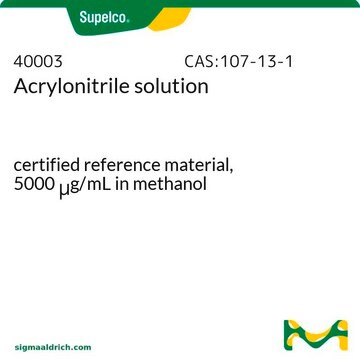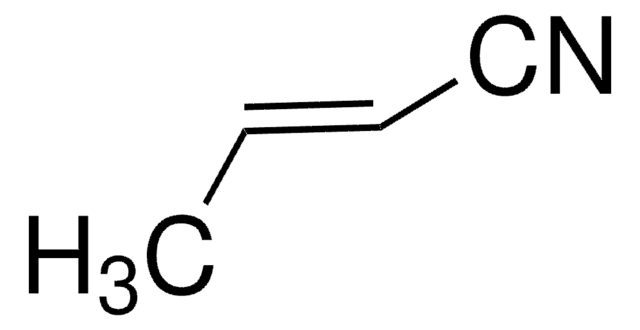110213
Acrylonitrile
≥99%, contains 35-45 ppm monomethyl ether hydroquinone as inhibitor
동의어(들):
Vinyl cyanide
로그인조직 및 계약 가격 보기
크기 선택
모든 사진(4)
크기 선택
보기 변경
About This Item
Linear Formula:
CH2=CHCN
CAS Number:
Molecular Weight:
53.06
Beilstein:
605310
EC Number:
MDL number:
UNSPSC 코드:
12162002
PubChem Substance ID:
NACRES:
NA.23
추천 제품
일반 설명
Acrylonitrile is commonly used as a monomer which belongs to the class of unsaturated nitriles. It serves as a key monomer in the production of various polymers and copolymers with desirable properties. Acrylonitrile is commonly employed in the production of acrylic fibers, which are known for their softness, strength, and excellent thermal and chemical resistance. One of the primary applications of acrylonitrile is in the manufacturing of acrylonitrile-butadiene-styrene (ABS) copolymers. ABS is a versatile and highly durable plastic widely used in automotive components, appliances, electronic enclosures, and consumer goods. The addition of acrylonitrile to the copolymer enhances its heat resistance and impact strength, making ABS a highly sought-after material.
애플리케이션
Acrylonitrile can be used as a monomer:
- In the preparation of the 3D-printed polymer material, Acrylonitrile Butadiene Styrene (ABS) which is a commonly used engineering thermoplastic known for its high strength, durability, and heat resistance. It serves as a suitable substrate for a wide range of applications, including in the medical field, compatible manufacturing processes, injection molding, blow molding, and extrusion.
- In the copolymerization with lignosulfonate to develop a carbon fiber precursor. This copolymer can serve as a precursor material that undergoes further thermal treatment to produce carbon fibers.
- To synthesize acrylamide grafted acrylonitrile copolymer membranes, which serve as a support matrix for the immobilization of cellulase enzymes.
Acrylonitrile is used in the manufacture of acrylic fibers, resins (acrylonitrile butadiene-styrene, styrene-acrylonitrile and others) and nitrile rubbers (butadiene-acrylonitrile).
생화학적/생리학적 작용
An industrial carcinogen that is a multisite carcinogen in rats and possibly carcinogenic to humans.
신호어
Danger
Hazard Classifications
Acute Tox. 3 Dermal - Acute Tox. 3 Inhalation - Acute Tox. 3 Oral - Aquatic Chronic 2 - Carc. 1B - Eye Dam. 1 - Flam. Liq. 2 - Skin Irrit. 2 - Skin Sens. 1B - STOT SE 3
표적 기관
Respiratory system
Storage Class Code
3 - Flammable liquids
WGK
WGK 3
Flash Point (°F)
23.0 °F - closed cup
Flash Point (°C)
-5 °C - closed cup
개인 보호 장비
Faceshields, Gloves, Goggles, type ABEK (EN14387) respirator filter
이미 열람한 고객
J Whysner et al.
Regulatory toxicology and pharmacology : RTP, 27(3), 217-239 (1998-08-07)
Acrylonitrile (ACN) exposure is associated with tumors in rat brain, Zymbal gland, and mammary gland. Adducts affecting base pairing were formed in isolated DNA exposed in vitro to the ACN metabolite cyanoethylene oxide (CNEO). DNA from liver, which is not
Philip Cole et al.
Regulatory toxicology and pharmacology : RTP, 52(3), 342-351 (2008-10-18)
Several retrospective cohort epidemiology studies evaluated a number of health outcomes in workers exposed to acrylonitrile (AN). The epidemiology studies included in this review have been published since 1970 and were identified through Ovid and MEDLINE retrieval services using search
N A Esmen
Scandinavian journal of work, environment & health, 24 Suppl 2, 63-70 (1998-08-26)
The reconstruction of worker exposures has been the mainstay of modem industrial epidemiologic studies. In most cases, the researchers are faced with the difficult dilemma created by the scarcity of the exposure measurement data vis-à-vis the demands for refined quantification.
Acrylonitrile and human cancer--an overview.
D Coggon et al.
Scandinavian journal of work, environment & health, 24 Suppl 2, 81-82 (1998-08-26)
A Léonard et al.
Mutation research, 436(3), 263-283 (1999-06-04)
Acrylonitrile (AN) is an important intermediary for the synthesis of a variety of organic products, such as artificial fibres, household articles and resins. Although acute effects are the primary concern for an exposure to AN, potential genotoxic, carcinogenic and teratogenic
자사의 과학자팀은 생명 과학, 재료 과학, 화학 합성, 크로마토그래피, 분석 및 기타 많은 영역을 포함한 모든 과학 분야에 경험이 있습니다..
고객지원팀으로 연락바랍니다.













